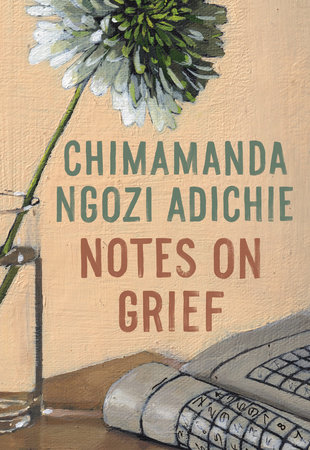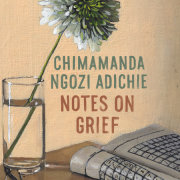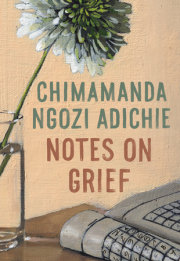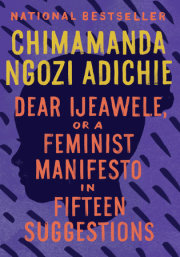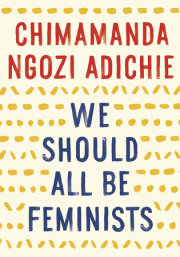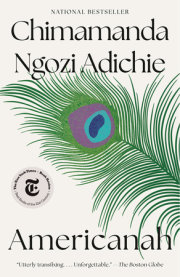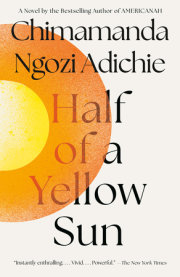“This intimate work implores, jerks us out of callousness, moves grief closer . . . Notes on Grief lays a path by which we might mourn our individual traumas among the aggregate suffering of this harrowing time. Our guide, Adichie, is uncloaked, full of ‘wretched, roaring rage,’ teaching us how to gather our disparate selves and navigate the still-raging pandemic. In the texture of many of these sentences you can almost feel where the writer has resisted bearing down with her refining tools—language and memory—so as to allow her emotional reality to remain splintered and sharp. Adichie is a consummate world-builder . . . Over the course of these 30 fragments, we witness a shift in perspective, an assurance that whatever comes next will never have been created before.”
—Sarah M. Broom, The New York Times Book Review [front-page review]
“Notes on Grief makes visceral the experience of death and grieving. In poetic bursts of imagistic prose that mirror the fracturing of self after the death of a beloved parent, Adichie constructs a narrative of mourning — of haunting and of love. Notes on Grief becomes a work larger than its slim size, universal in the experience of the loss of a parent, and the struggle to mourn that loss.”
—Hope Wabuke, NPR.org
“Elegantly spare . . . brutally frank . . With raw eloquence, Notes on Grief is both achingly personal and stunningly familiar to anyone who has felt the ‘permanent scattering’ [of grief]. Written and published less than a year after her father’s death, Adichie’s pain on these pages is so palpable that one can almost taste its bitterness. She captures the bewildering messiness of loss in a society that requires serenity, when you’d rather just scream. Grief is impolite . . . Adichie’s words put welcome, authentic voice to this most universal of emotions, which is also one of the most universally avoided.”
—Leslie Gray Streeter, The Washington Post
“Adichie unflinchingly gazes into the black hole of grief as through a telescope, exposing intimate moments and public convulsions while tapping her roots to channel a spectrum of emotions . . . Candid, elegant . . . The writer meets the moment.”
—Oprah Daily, “20 Best Books of May”
“A story of loss achingly of its time . . . Adichie struggles not only with the shock of her unexpected loss but also with the impossibility of distance and by extension, access. She also realizes that each step toward the official recognition of [her father’s] passing will force her to accept that it has happened. I really appreciated Adichie’s discomfort with the language of grief. Books often come to you just when you need them . . . A book on grief is not the kind of book you want to have to give to anyone. But here we are.”
—Allison Arieff, San Francisco Chronicle
“A poignant reflection… Adichie recounts her efforts to cope with her loss, to accept condolences, to carry out the inevitable rituals of death. Her Dad emerges as a wise, kind, thoughtful and understanding presence throughout Notes on Grief . . .The loveliest writing, however, is not about James Nwoye Adichie, but about the anguish and longing his death produces in those who suffer his absence most acutely. In death, those we love become more than we understood, more than we can ever remember alone. Adichie appreciates this power.”
—Carlos Lozada, The Washington Post
“Adichie’s exquisitely forthright chronicle of grief generously articulates the harrowing amplification of sorrow, helplessness, and loss during the COVID-19 pandemic . . . An intimate and essential illumination of a tragic time.”
—Booklist
“Spare and yet spiritually nutritious, the book serves as a reflection of Adichie’s turmoil in loss. It is also an exquisitely written tribute to her father, James Nwoye Adichie, who was Nigeria’s first professor of statistics: his self-effacement, sense of calm and wry humor shine through.”
—Catherine Taylor, The Guardian US
“Adichie's great strength is the authority of her voice, her moral and emotional centeredness that draws the resistant close. Here, she insists on her right to desolation in response to the singular loss of her father.”
—Maureen Corrigan, “Fresh Air”
“It is the sense of disbelief, the messiness and confusion with which we meet the loss of our loved ones, that Adichie describes so well. Upon hearing the news about her father’s death, she
collapses, and she writes about that collapse unsparingly . . . More than any other piece I’ve read recently, Adichie’s book captures the harshness of mourning in a time of pandemic.”
—Nilanjana Roy, Financial Times
“Fierce, tender and raw . . . In Notes on Grief, Adichie reveals a more private self. This is a cathartic work for Adichie, a way to keep alive the spirit of her father by telling his stories. And in her writing, her father shines as a man of deep kindness and integrity, a dry wit and successful academic who was unstinting in his support of his daughter’s ambitions.”
—Anderson Tepper, Los Angeles Times
“It is the sense of disbelief, the messiness and confusion with which we meet the loss of our loved ones, that Adichie describes so well. Upon hearing the news about her father’s death, she collapses, and she writes about that collapse unsparingly . . . More than any other piece I’ve read recently, Adichie’s book captures the harshness of mourning in a time of pandemic.”
—Nilanjana Roy, Financial Times
“What is most memorable in this tribute is Adichie’s father’s love for his family and their enduring love for him. Adichie simply calls him 'the loveliest man.' A raw, moving account of mourning and loss, Adichie’s memoir reminds us there is no right or wrong way to grieve and that celebrating life every day is the best way to honor our loved ones.”
—Sarojini Seupersad, BookPage
“Elegant, moving . . . An affecting paean to the author’s father, James Nwoye Adichie. The first professor of statistics in his country, James lived an eventful and sometimes fraught life. Funny and principled, he died during the pandemic—not of the virus but kidney disease. Adichie moves through some of the classic stages of grief, including no small amount of anger. . . Eventually, she reflects on a newfound awareness of mortality and finds a ‘new urgency’ to live her life and do her work.” —Kirkus [starred review]

